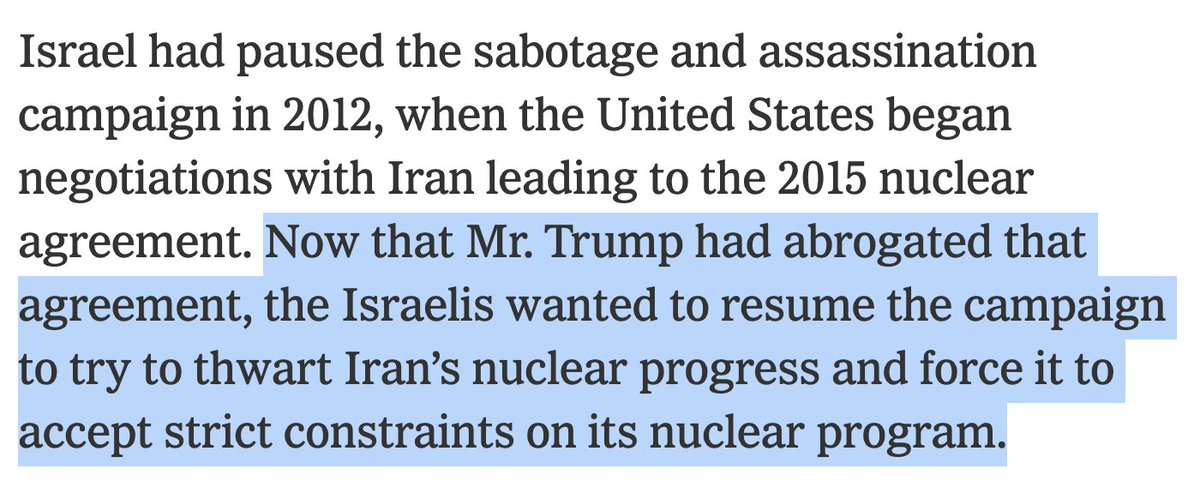
🧵:
Fascinating story by @nytimes, but there are systemic flaws in its coverage of Israel/Iran. Don’t know Ronen Bergman, but @farnazfassihi is an outstanding reporter. Still, the systemic whitewashing of Israeli actions & motives is very troublesome.>>
nytimes.com/2021/09/18/wor…
Fascinating story by @nytimes, but there are systemic flaws in its coverage of Israel/Iran. Don’t know Ronen Bergman, but @farnazfassihi is an outstanding reporter. Still, the systemic whitewashing of Israeli actions & motives is very troublesome.>>
nytimes.com/2021/09/18/wor…
2. No less than 3 times (!) does it cite Israel’s justification for its assassinations at face value: It’s solely to stop Iran’s (non-existent) “nuclear weapons program.” No mention that US intelligence assesses that Iran has NOT had an active weapons program since 2003. >> 





3. All 3 cases are unjustifiably deferential to Israel's official line with not even an ounce of scrutiny of the statements of a gov the Times itself has reported seeks to start a war.
This type of deference is sadly how the @nytimes helped sell the Iraq war.>>
This type of deference is sadly how the @nytimes helped sell the Iraq war.>>
4. Particularly astonishing that it categorically writes that Israel sought to force Iran “to accept strict constraints” on its program. In reality, Israel pushed for wildly unrealistic restrictions it knew Iran never would accept, in order to escalate matters to a conflict>> 

5. Even if @Nytimes rejects that explanation, it should not categorically repeat Israel’s official line as the unquestioned truth. It should make clear that this explanation is Israel's claim of its motives - not a truth verified and endorsed by the Times. >>
6. When Iran claims it doesn't seek nukes, @nytimes does not accept such statements at face value - nor should it. It should always scrutinize statements by gov officials - whether they be Iranian, American or Israeli. Yet, Israel seems to systematically escape such scrutiny.>>
7. In fact, in this very piece, @nytimes correctly questions Iran’s claims that it knew of the plot, and points to possible Iranian motives of doing “damage control after an embarrassing intelligence failure.” No such journalistic scrutiny of Israeli claims, however.>> 

8. Bizarrely, the piece later acknowledges that Netanyahu sought to kill Biden’s chances of reviving the #IranDeal. Add this to the acceptance of Israel’s motives, and you have accepted Netanyahu’s logic that to prevent an Iranian bomb, the JCPOA must be killed. >> 

9. That’s the kind of pickles you end up in when you put Israel above scrutiny. Again, this does not appear to be episodic, but systemic.
https://twitter.com/tparsi/status/1439640648966082562
10. There’s more. The piece claims the Mossad agents on the ground were Iranian. That is quite likely. But the piece is silent on who they may be. One likely possibility is that they are members of the MEK, a notorious terrorist organization.
nybooks.com/daily/2018/07/…
nybooks.com/daily/2018/07/…
11. The MEK was on the US’s terrorist list for its assassinations of Americans, Iranians, and its crimes against Iraqis when it served as Saddam’s foot soldiers. It was taken off the list by the Clinton State Dep in 2012 after an arguably illegal lobbying campaign.>>
12. NBC confirmed in 2012 that Israel used MEK agents to assassinate Iranian scientists. If they used MEK to kill Fakhrizadeh, the US decision to delist them will look even more unjustified since they had to reject violence to get off the terror list.../
nbcnews.com/news/world/isr…
nbcnews.com/news/world/isr…
• • •
Missing some Tweet in this thread? You can try to
force a refresh



